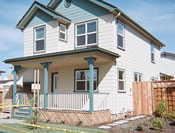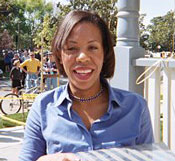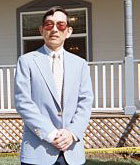
Boom Fatigue
by Jon Gordon
April 2000
You'd be hard-pressed to argue that the current economic boom is a bad
thing. But it has a downside. We're working harder, seeing our families
less, and coping with busier airports, freeways and retail stores. One
researcher has given a name to the stress that good economic times can
produce: "boom fatigue." That
fatigue is evident in the epicenter of the boom, San Francisco and Silicon
Valley.
 |
 |

|
This house on Grant Street in Campbell, California would sell for half a million dollars in the overheated Silicon Valley housing market. But Habitat for Humanity built this house, and it was sold to a family that would be solidly middle class in many ot
her areas.
Photo: Jon Gordon
|
|
 |
| |
IN A RECENT STUDY,
Rutgers University Professor Carl Van Horn looks at how
American
workers feel about the economic expansion. Van Horn conducts the survey
every year,
and for two years running he's found that even though Americans are
generally glad for
the economic boom, they're increasingly dissatisfied with their jobs and
their lives.
"When you look at the surface, it's the most positive economic
situation you can imagine," Van Horn says. "When you dig a little deeper, you realize there
are problems - problems in terms of people feeling pressure and stress."
There's certainly lots of pressure and stress in the Silicon Valley housing
market, where
the technology-led boom is driving home prices to astronomical levels. On a recent Saturday, a guitar-playing duo called "Los Compadres" entertained a crowd of about
100 near downtown Campbell, a well-to-do Silicon Valley city nestled at the foot of
the Santa Cruz
Mountains. People gathered to hoot and holler about the rarest of
commodities: two affordable houses; brand new four-bedroom, two-bath houses
selling for $110,000 each. The lucky buyers are getting the
homes from
Habitat for Humanity, a charity that usually sells houses to the poor for
about $45,000.
But this is Santa Clara County, where the median price of housing
is pushing
$500,000 dollars. The buyers have good jobs, and make enough money
to live
comfortably in the Twin Cities and many other places. But middle-class
income just
doesn't cut it in the Bay Area.
Theresa Jackson is buying one of these
subsidized houses.
She's an accountant with three young daughters. Jackson says until she
started working
with Habitat for Humanity, the overheated housing market - a product of
Silicon
Valley's economic boom - had worn her down. "I've gone to mortgage companies and have been laughed at, told 'no way'," she says. "For a person in my position, it is impossible in this area. I have a
lot of friends who are commuting in from Tracy and places real far away,
taking two or three hours one way just so they can afford a house. But for
us it would have been impossible, especially for a single parent needing to
be close to school."
 |
 |

|
Theresa Jackson, an accountant, recently bought a house in Silicon Valley with the help of Habitat for Humanity.
Photo: Jon Gordon
|
|
 |
| |
In Palo Alto, about 20 miles from Theresa Jackson's new house, Web designer
Ann
Bradley is desperately looking for a modest apartment to share with her
teenage son.
She's grown tired of going to open houses where more than 100
apartment-seekers
compete for the right to rent a room in a house for $1,500 a month. So
just the other
day she placed a unique ad in the Palo Alto Daily News.
Will trade domain name "thiswiredhouse.com" or "etakeout.com" for
Palo Alto living situation.
That's right; my dotcom address for your street address.
"I saw an ad for a
place for $995 dollars a month," Bradley recalls. "It was a room in a house, it had a small
kitchen and half a bath. And half a bath is just not acceptable at $995 a
month. You have to have a place to take a shower."
No one has taken Bradley up on her offer so far. Higher prices for
apartments and
houses are just one of the expansion-related phenomena that causes stress.
Denise
Sullivan, a third-generation San Franciscan, says the boom has transformed
her city for
the worse. Over coffee in a Mission District cafe, Sullivan laments that San
Francisco now aggravates her. "I don't like to go out as much anymore," she says. "I certainly don't consider
going to a movie on a Friday or a Saturday. There's no way I would do that.
Everything is too crowded."
Five years ago, before the dot-comification of San Francisco, it was a
mellower scene."It was a friendly place to live and work, "Sullivan recalls. "It wasn't about
survival, it wasn't about being the first person when you see that vacancy
for that apartment and then bidding over the asking price for the apartment.
People are willing to pay more rent than advertised."
 |
 |

|
Dave Ahn, president of the board of Habitat for Humanity's Silicon Valley chapter, stands in front of a recently built home that sold for $110,000. On the open market such a house would command $500,000 or more.
Photo: Jon Gordon
|
|
 |
| |
"This all contributes to the difficulty people report in balancing work and
family, because when they leave work, it's harder to get home at night, it's
harder to get to work in the morning," says researcher Carl Van Horn. "So what they are looking for is, how
do I achieve a better balance?"
Van Horn says many people are tired of the expansion, but not so weary they
wish for the opposite: recession. "Overall Americans are satisfied with their jobs and they're very
happy with the current state of the economy. They want to see it continue.
But they're saying ok, with this new economy, how do we come up with a
better way to achieve positive economic growth without driving us into the
ground?"
Van Horn says the boom-fatigued would benefit from more flexible work
schedules,
and widespread telecommuting. He says people would feel better about their
jobs and
home life if they could be off the roads at busy times, and with their
families more often.
What people are seeking, he says, is a better balance between work and their
personal
lives - something that's often missing in this long boom.
![]()
![]()
![]()

![]()
![]()
![]()

![]()
![]()
![]()

![]()
